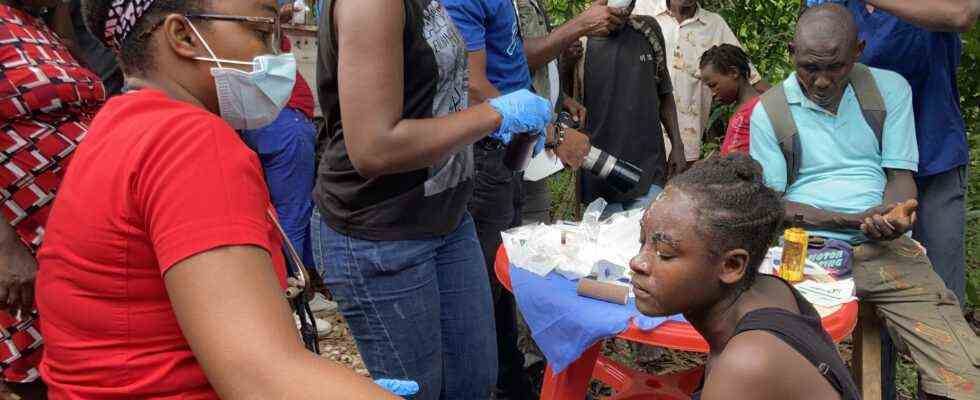Status: 08/22/2021 12:38 p.m.
Around a week after the severe earthquake in Haiti, thousands of people are still in need of medical help. But there is a lack of that. NGOs are now trying to provide at least basic services.
People crowd in front of a blue plastic tarpaulin. It serves as a privacy screen. Behind it a woman is sitting on a plastic chair, a doctor is taking her blood pressure. It is a mobile health station that stopped in Marceline, a small place that was particularly hard hit by the earthquake. The mood is heated.
A man holds his head as if to protect himself from the noise around him:
I heard about the mobile clinic and came here. I need medication. But there are so many people here. I lost everything, my house collapsed. I don’t even have a plastic tarpaulin to protect myself from the rain. We have no water. Vans passed here yesterday, they distributed water bottles. But you have to be quick.
He breaks off the conversation, hobbles on, doesn’t seem to be able to put any weight on his leg. He pushes through the crowd.
Potential patients surround the coordinator of the mobile hospital ward. They want to be added to the list, they want to scream to make themselves heard. Phogeas Junior works for the Haitian non-governmental organization PWOP. He patiently notes their names.
We are treating people here because many of the hospitals in the region have been destroyed or damaged. Medical care was inadequate even before the earthquake and even less so in this situation. But we don’t have the capacity to cater for everyone.
According to Phogeas Junior, there is a lack of medication, especially painkillers. The team can only treat a maximum of 50 people that day. However, there are around 200 who have been waiting for hours to get medical care.
The coordinator of the mobile sick bay complains that not all people can be cared for.
The sun is beating down on the waiting people. They come with broken legs, deep abrasions on their faces, severe head injuries because the ceiling has collapsed over them and they were just barely able to save themselves. Parents come who are worried because their son lost the language after the earthquake, reports the NGO employee.
The mobile health station is on the road with a team of around 15 throughout the region. They drive from place to place by car, on roads that are barely passable. The quake has left deep furrows.
International aid started slowly
Many houses in Marceline have collapsed completely. There is no water, there is no food, no electricity. The government doesn’t care, I keep hearing. International aid also got off to a slow start at first. It is friends, neighbors and initiatives like the mobile health station that are helping people these days. A few days ago, desperate victims are said to have plundered one of the few aid convoys, the news said.
People stand on the rubble of their homes in Haiti, destroyed by the earthquake.
The mood in front of the mobile clinic could also change, believes a man who is hoping for the medication:
I’m afraid there will be another fight here. I don’t want to get hurt any more. I’d rather go home again.
But his home is just a pile of rubble.
About a week after the earthquake in Haiti: Help urgently needed
Anne Demmer, ARD Mexico City, August 22, 2021 11:28 a.m.

